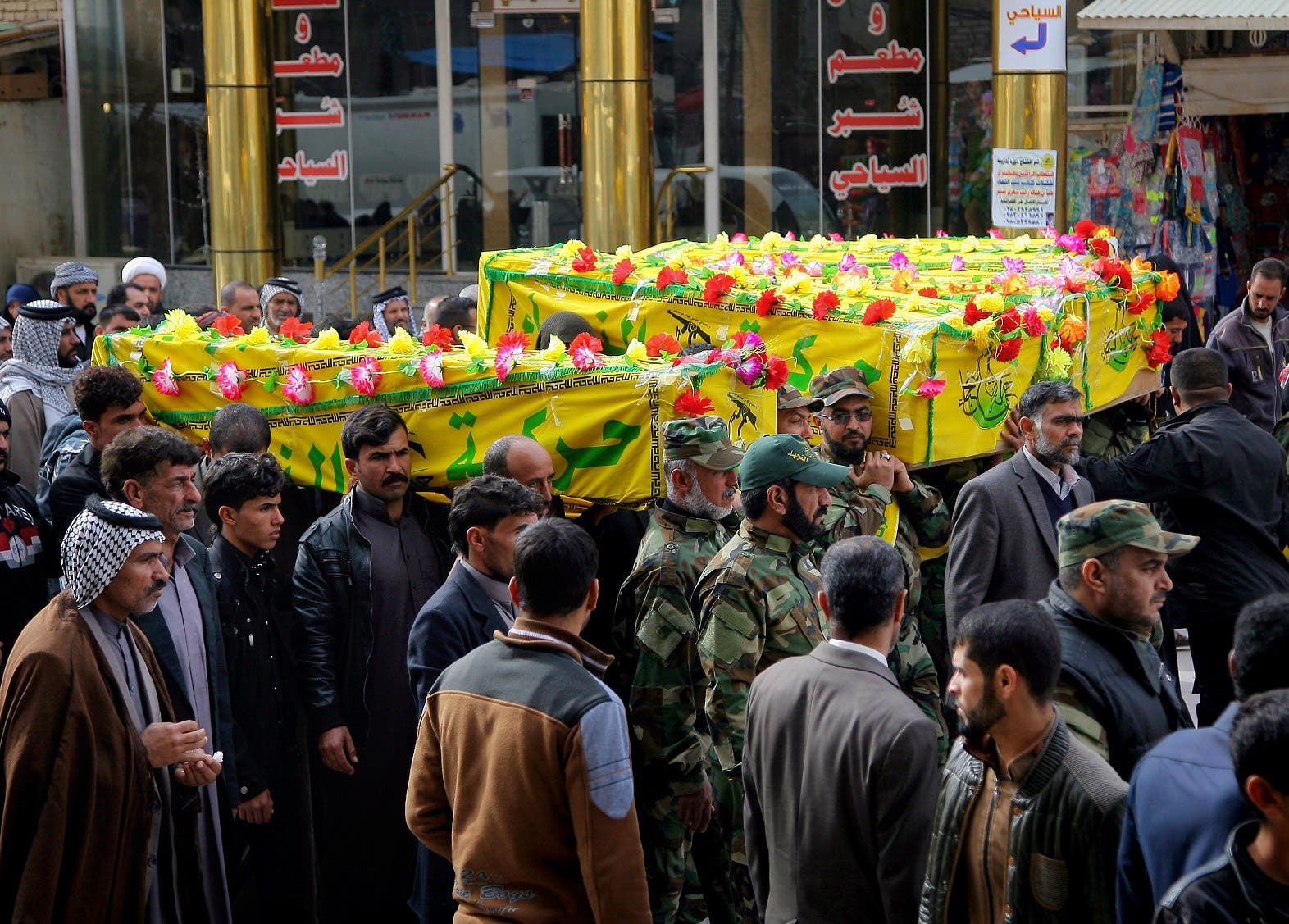
Members of an Iraqi Shiite militant group called
Asaib Ahl al-Haq, or League of the Righteous, chant slogans against the
Syrian opposition as they carry the coffin of a Shiite fighter, Mahdi
Adnan, during his funeral procession in the Shiite holy city of Najaf.
(File photo: AP)
In a southern suburb in the
Syrian capital Damascus, Shiite fighters from neighboring Iraq stand to
protect a shrine they highly revere.
But these fighters, who are allied with Syrian
President Bashar al-Assad’s regime, operate far beyond the city’s
limits. Their presence reportedly stretches as far as Syria’s second
city of Aleppo.
On Monday, an Iraqi Shiite paramilitary
organization said on its website that its fighters “have foiled an
attack by [Syria’s Al-Qaeda affiliate] Nusra Front in [northwestern city
of] Aleppo and killed six.”
The group, known as the Harakat al-Nujaba, or
Movement of the Noble, was formed with the help of the Iranian
Revolutionary Guards’ elite Quds force. In the statement, the group said
it also thwarted a Nusra Front attack aimed at cutting aid routes to
two Shiite towns.
Nujaba admittance of its presence in Syria was
unusual. Other Iraqi Shiite groups typically justify their stay in
Syria under the pretext of protecting the capital’s
Sayyidah Zaynab shrine.
“Iran deliberately casts a confusing web of
these militias and commanders [in Syria],” he added. This makes the
groups difficult to track and their escapades abroad “look like a
spontaneous act of religious devotion.”
This covert moves hide Iran’s “imperial power play” in Syria, he added.
Russia, Iran, and the allied Lebanese
Hezbollah Shiite movement have been key for Assad’s survival throughout
the spiraling conflict, which began in 2011.
Nujaba’s sponsor, the Iranian Quds Force, specializes in foreign expeditions. The elite unit was
designated nine years ago by the US as a “terrorist organization” for aiding militant groups in Iraq and Afghanistan.
Some of the leaders of the current Iraqi
Shiite groups active in Syria are veterans of the Iran-Iraq war, which
began in 1980 and dragged on for eight years.
The oldest Iranian “proxy militia,” the Badr
Corps – who fought with Iran during the Iran-Iraq war in the 1980s – is
currently fighting for Assad, he said.
Other Iraqi Shiite militia groups, including
Iraqi Kata’ib Hezbollah and Asaib Ahl al-Haq (AAH) are “splinters from
Jaysh al-Mahdi, and who often work through the Lebanese Hezbollah, and
are led by Badr commanders,” he added.
The analyst said that two major groups are
currently aiding Assad’s forces in Aleppo. These two groups are the
Nujaba, led by Akram al-Ka’abi, an old AAH commander; and Kataib al-Imam
Ali, headed by Jamal Ebrahimi.
Although of Iraqi origins, Ebrahimi,
better-known as Abu Mahdi al-Muhandis, is in effect “the deputy of Quds
Force Commander Qassem Suleimani,” the analyst claimed.
Some of these groups also have a big role in
the hard-hitting Popular Mobilization Units (PMU) – a cohort of 40,000
volunteers formed in Baghdad’s response to ISIS militants seizing large
areas of Iraq.
PMU-backed Iraqi army and Kurdish Peshmerga forces
began on Thursday moves to retake Iraq’s second largest city of Mosul, which was seized by ISIS in 2014.
Early this year, a PMU spokesman told
Al-Monitor
that his group is not sending fighters to Syria – as their main target
was to rid Iraq of ISIS. However, he said that independent armed
factions were sending their fighters to back Assad.
Another analyst said that both the PMU and
Baghdad have pulled a “tactical move” by not admitting that Shiite Iraqi
groups were not on the ground in Syria.
“We know that dead [Iraqi] fighters are coming
in coffins from Syria,” said Ghassan al-Attiyah, the head of the
London-based Iraqi Foundation for Development and Democracy. “And in
Iraq, they say the fighters were killed in Syria.”
Baghdad’s inability to keep its allied
militias within its borders appears to step on the authority of Iraqi
Prime Minister Haider Abadi.
The
Iraqi constitution states that the country must not interfere in the internal affairs of other states, and stresses “good neighbor” principles.
“Abadi cannot acknowledge their existence because he cannot do anything,” Attiyah said.
Since taking after his predecessor Nouri al-Maliki was pressured to resign in Sep. 2014, Abadi
pledged to root out corruption, which he said was one of the most serious issues facing his country.
As a result of his reforms, Washington has pledged $1.5 billion to train Iraqi forces. But among his many
adversaries and increasingly powerful militias, Abadi is not seen as having a firm grasp on power.
Abadi tried unsuccessfully last year to absorb
PMU forces into a new National Guard. The new elite unit failed as it
did not recruit enough Sunni fighters, who felt marginalized by Maliki’s
policies over his eight-year rule.
“This is tug of war,” said Attiyah. “How will
this happen when Abadi is not strong enough to be decisive and start
incorporating the constructive elements in the PMU?”
The analyst described the Shiite-dominated PMU
as being made up of three loose groups: pro-Iranian militias, Shiite
devotees, and government loyalists.
Some believe that Iraq should stay out of the affairs of other nations altogether.
“As Iraqis, we have paid a high price due to
the left and right intervention in Iraq’s affairs,” said Iraqi
parliamentarian Abdulkarim Abttan, who heads the secular Wataniya
Coalition.
“Abadi is not weak, he works as prime minister for Iraq and not for [non-Iraqi] Arabs.”
Last Update: Friday, 25 March 2016 KSA 16:22 – GMT 13:22

